Posted in Minoli
17th May 2024
An increasingly important requirement and preference in modern building specifications is to lessen the environmental impact and improve the sustainability of both the materials used in construction and the performance of the final building.
Also, in terms of Corporate Social Responsibility and more rounded procurement criteria, there’s greater focus on the behaviours and commitments of companies in the supply chain to demonstrate their awareness and accountability for reducing carbon footprints, consumption, emissions and wastage, and for helping to create a more inclusive and socially equitable economy.
At Minoli we have our own environmental policy which sets out how we aim to proactively reduce the impact of our day-to-day business activities, such as by reducing ‘tile miles’, running a modern and upgraded fleet of lower emission vehicles, operating predominately electric powered warehouse handling equipment, reducing and responsibly disposing of waste, and having an internal recycling protocol, amongst other initiatives.
Furthermore, we’re also conscious of the provenance of the products we distribute and the ethics and activities of the production partners that we choose. Minoli are fortunate to work with some of the leading producers in the Italian and Spanish ceramics industries – companies that believe in pursuing sustainable manufacturing and operating policies for the benefit of the planet and those that inhabit it, and because it makes good business sense.
Of course, there are a wide range of environmental standards and accreditations that manufacturers can achieve or be associated with, and not all products have the same material composition or manufacturing process, but Minoli’s main production partners are all working towards greener goals and third-party validation of their achievements from various institutions and authorities.
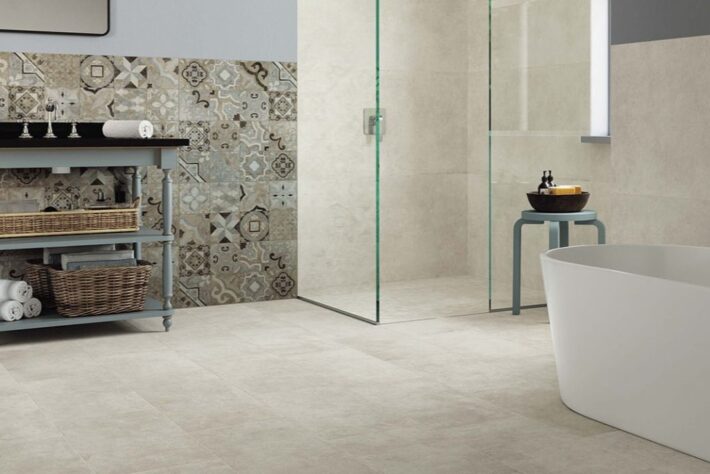
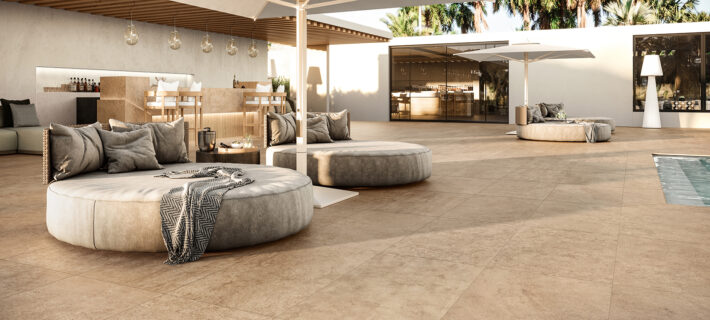
To demonstrate that Minoli’s products meet selected criteria for sustainable construction, have a reduced impact on the environment and positively influence the health and welfare of the population, our key production partners hold various certifications or support environmental programmes including*:
- ISO 9001 – The internationally recognized quality management system standard that helps businesses continuously improve their products and services.
- LEED – Leadership in Energy and Environmental Design – which independently verifies that porcelain and white body wall tiles can be used in projects that follow Green Building Council guidelines and contribute to obtaining LEED V4 ratings of buildings.
- EPD – Environmental Product Declarations that communicate a product’s environmental performance to enable designers and end users to make informed and conscious choices.
- PEF – Product Environmental Footprint – a measurement of the environmental performance of a product or service over its lifetime from raw material extraction, production, use and end of life.
- FDES & HPD – Environmental and Health Declarations that provide complete reports not only on the product’s lifecycle impact but also on the health characteristics of the finished product.
- CAM / ISO 14021 – Declaring the observance of the Minimum Environmental Criteria and the adoption of sustainable policies to allow product inclusion in Green Public Tenders.
- ECOVADIS – The Silver level business sustainability certification of the leading Italian plants positions them in the top 25% across all companies & all industries assessed worldwide by Ecovadis.
- DECLARE – A platform by the International Living Future Institute on which manufacturers can disclose product information to demonstrate they are safe and absent of harmful substances.
- VERDE – A buildings sustainability certification developed by the Green Building Council Spain, for which Spanish manufacturers provide detailed information to support compliance.
- BREEAM – A global method for assessment and certification of the technical sustainability of buildings in support of which our main tile production plants continually assess their products and certify their continued reduction in environmental impact.
In addition to these wide-ranging technical product and systems assessments, when considering the low environmental impact and sustainable nature of porcelain paving, one should also reflect on the inherent qualities of the raw materials and extraction methods, the production and transportation processes, the varied uses and longevity of the tiles, and the eventual disposal at end of serviceable life.
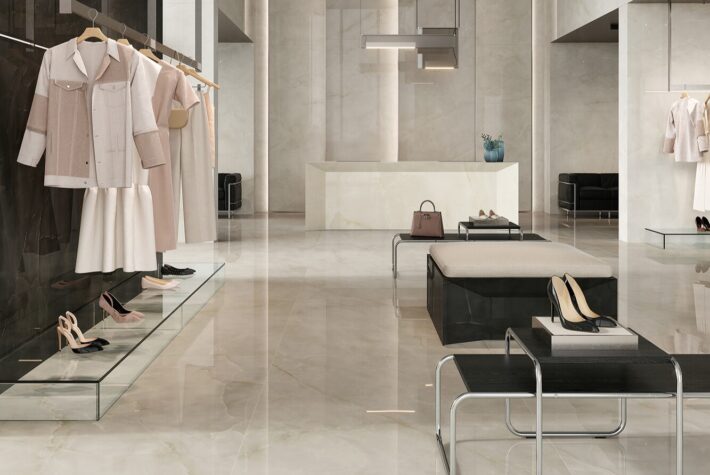
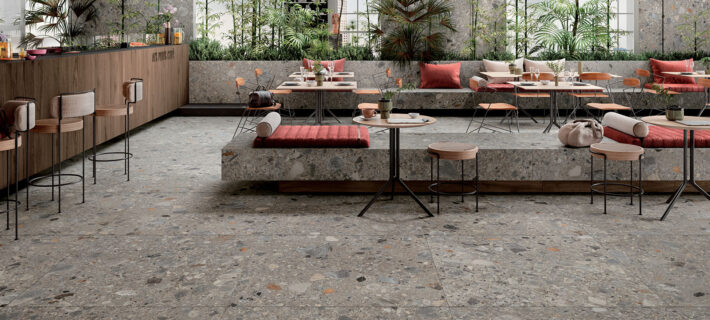
Porcelain tiles are manufactured according to energy and water-efficiency criteria and are an environmentally friendly choice due to their long-lasting and recyclable characteristics. Production is considered ‘zero waste’, based on the use of natural and always reusable materials, plus they are hygienic and do not contain any volatile organic compounds (VOCs), formaldehyde, PVC, plastics or petroleum derivatives.
Whilst porcelain and ceramic tiles do use natural resources in their production, such as clay and common rocks like feldspar, quartz, silica and kaolin, these materials can be sourced responsibly, extracted more easily than quarried marble or stone, and are abundant in supply. Porcelain production also uses natural resources efficiently and Minoli’s leading production partners have achieved the total recovery of all process water and production scrap, significant gains in heat recovery from production lines and furnaces, plus have diverted nearly all waste back into a circular recycling process. Some have even created their own water reservoirs and solar farms to be almost entirely self-sufficient and have developed automated vertical warehousing to reduce CO2 emissions.
Beyond production, porcelain tiles and paving are remarkably durable, so reducing the need to replace or reinstall for many years. They are also easy to clean and maintain, without the need for toxic chemicals, so minimising the introduction of harmful pollutants into the local ecosystem. When used outside, to help deliver more sustainable landscapes, porcelain paving can be installed in a way that promotes efficient water runoff and drainage, helping to prevent erosion, while conserving water resources.
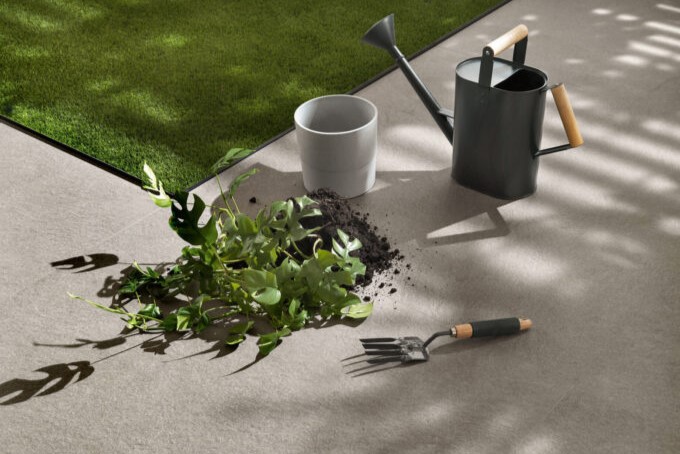
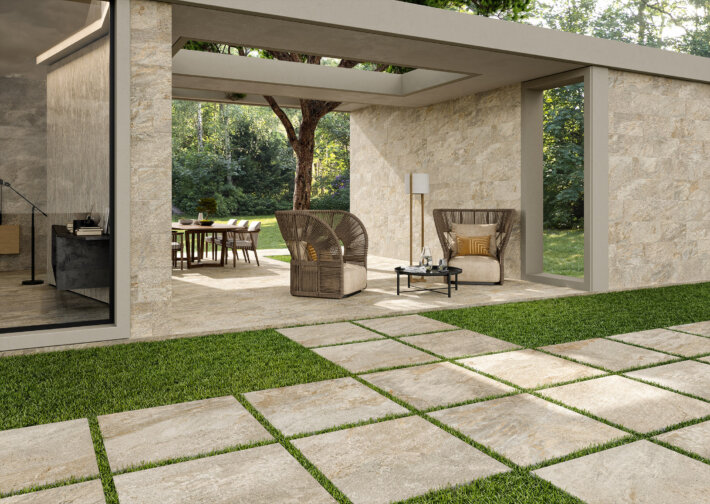
Lastly, when porcelain tiles do reach the end of their useable term, they are entirely recyclable and can be used in various new applications, so avoiding landfill.
If you would like to include more eco-friendly and sustainable surface solutions in a forthcoming project, whether using indoor tiles or outdoor porcelain pavers, our teams can advise on the relevant sustainability standards and specifications for different Minoli products*, according to what information is provided by the manufacturer.
– Minoli Oxford – 01865 778225 / showroom@minoli.co.uk
– Minoli London – 020 7474 2934 / thesurfacewithin@minoli.co.uk
– Outdoor Specific Product Enquiries – 01865 778225 / outdoor@minoli.co.uk
– Corporate Clients – Please contact your account manager directly / developers@minoli.co.uk
As the importance of environmentally responsible construction and design becomes heightened, making the right choices of material will be crucial in achieving the required standards, client preferences and best long-term outcomes for all.
*Please note: The certifications and environmental standards listed are held by one or more of Minoli’s main production partners. Not all manufacturing partners have achieved certification in all those listed and some of the environmental programmes are country specific to Italy or Spain, for instance. Similarly, not all of Minoli’s products have the same material composition or manufacturing process – some are porcelain and others ceramic, and product ranges may have different raw materials and glazing components. As such, if a specific material specification is required for a project, advice should be sought about the individual products in question. Minoli rely on the availability of technical product information from our production partners.